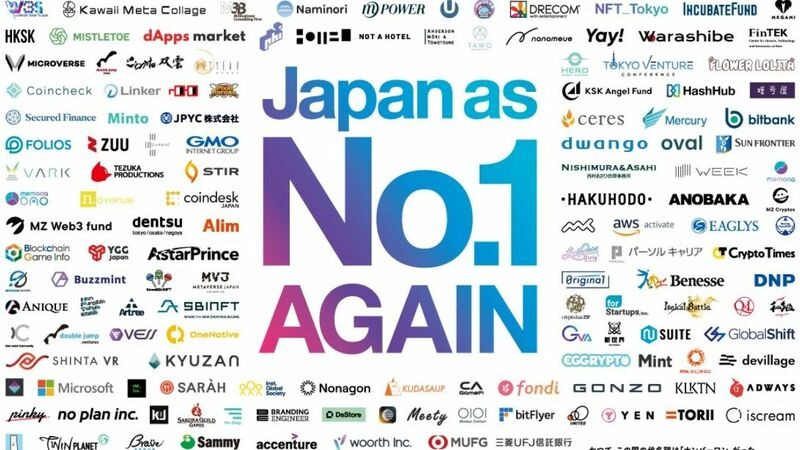Can "Web3", which the Japanese government is also focusing on, become a technology to make Japan shine again?

The Digital Agency has announced that it will hold a "Web 3.0 study group", and it is attracting attention in the industry.
This seems to have been announced by Digital Minister Kono, but in accordance with the policy of the "Priority Plan for Realizing a Digital Society" decided by the Cabinet in June, we plan to organize discussions in cooperation with the Ministry of Internal Affairs and Communications and the Ministry of Economy, Trade and Industry. that's right.
Reference: Digital Agency "Web 3.0 Study Group" to be held Environmental preparation for promotion of NFT etc.
From the general public, there may be people who do not really understand why the government is going to the trouble of holding a study group on concepts such as Web 3.0 and Web 3 (Web3). .
On the other hand, there is an argument among the government and the Liberal Democratic Party that the promotion of Web3 itself will become a pillar of Japan's growth strategy.
I would like to introduce an overview.
Controversial definitions of Web3 and Web3.0
The concept of the term Web3 has historically been defined by various experts, and it is a term that has divided discussions even within the industry.
As an extreme example, there was an incident in which Impress, a well-established technical book publisher, published ``The Most Easy Web3 Textbook'', which was criticized for having ``many errors'' and went up in flames. I guess.
Reference: Book "Web3 textbook" collected due to many errors, author apologizes "Re-study from scratch"
At the moment, Web3's discussion revolves around a term coined by Ethereum co-founder Gavin Wood in 2014 to describe a "decentralized online ecosystem based on blockchain." , NFT, DAO, etc. It seems that it is often used as a general term for a series of technologies that have been attracting attention recently.
In the current Internet defined as Web 2.0, some companies such as Google and Facebook are said to have an oligopolistic influence.
Many people believe that Web3 technology has the potential to change the current situation.
Symbolic is the fact that Liberal Democratic Party lawmaker Taira said in an interview that "Web 2.0 lost, but Web 3 has a good chance of winning."
At the dawn of Web 2.0, various web service companies were born in Japan. Currently, there are few companies.
Therefore, the government and the Liberal Democratic Party are paying attention to Web3.
Kishida token was treated as a joke, but Web3 goes to a bold policy
Speaking of the Liberal Democratic Party's study session on Web3, there are many people who still remember that "Kishida Token" and "Koizumi Token" were distributed at the seminar held by the Youth Bureau of the Liberal Democratic Party in May. I guess.
Reference: Liberal Democratic Party to distribute digital "Kishida token" for the first time Is NFT serious?
The impact of the NFT image, which uses the Prime Minister's photo as a token as it is, is very large, and the fictional newspaper of the Internet media, which has gained popularity by distributing false news, bothers to tweet, ``This is real news.'' It was so much that it was made into a story.
However, discussions on NFT and Web3 are progressing steadily within the Liberal Democratic Party and the government, and in June, the Japanese government's "Basic Policy for Economic and Fiscal Management and Reform 2022 (Basic Policy 2022)" states that it will be based on blockchain technology. Environmental preparation for the promotion of Web 3.0, such as the use of NFTs (Non-Fungible Tokens), will be specified.
After that, in July, the "Web 3.0 (Web 3) Policy Promotion Office" was established in the Ministry of Economy, Trade and Industry. It is.
Even when Japan was the world's number one in cryptocurrency
Naturally, Japanese companies working on Web3 are eagerly awaiting this kind of movement.
In fact, at the dawn of the virtual currency boom around 2017, there was a time when Japan was the world's No. 1 trading volume.
According to Bloomberg's tally, the Japanese yen accounted for 55% of the world's cryptocurrency trading from October to December 2017.
Reference: Japan is Asia's largest cryptocurrency market despite the coin check scandal
According to industry insiders at the time, the Financial Services Agency was also taking a positive stance on the development of cryptocurrencies, and quite a few people boasted that Japan would dominate the world in the cryptocurrency market.
However, the coin check incident in January 2018 changed the tide at once. Various virtual currency regulations and supervisory stances were reviewed, which resulted in Japan slipping from the leader position.
Japanese companies aiming for the world with Web3
However, not all industry players have given up on Japan's potential for Web3.
In particular, the “Aster Network”, which has become a hot topic after being listed on Bitbank, is attracting attention as a representative entity.
"Aster Network" is a mechanism for realizing interconnection of different blockchains, called a public chain, and is a service from Japan operated mainly by founder Sota Watanabe.
However, in the current regulatory environment in Japan, it was determined that it would be difficult to launch a public chain from scratch, so they launched a company called Stake Technologies based in Singapore and entered Japan by re-importing its services to Japan. It is.
Reference: Bringing Japanese companies to the world with Web3, what "Astar Japan Lab" aims for
The most symbolic example is the newspaper advertisement titled "Japan as No.1 AGAIN" that was deployed at the time when "Aster Network" was listed.
In addition to Web3 startups, this ad includes names of 329 companies, including major Japanese companies such as Dentsu and Hakuhodo, and foreign companies such as Microsoft and Accenture.
At the same time as this advertisement, a posting campaign using the hashtag "#web3 can do it" was also developed, and it seems that it was showing excitement in the neighborhood, such as ranking second in the Twitter trend.
This advertisement has the following declaration to the effect that Japan will become number one in Web3 again.
Once upon a time, the pronoun of this country was "number one".
A time when Japan was leading the world.
Is it a story from the distant past?
Wrong.
Now the country has another chance.
We strongly believe so.
Japanese Web3 entrepreneurs such as Sota Watanabe have raised concerns about Japan's current regulations on Web3 through various media and events, and it can be said that the current government and LDP movements are in response to this. prize.
Can Web3 become one of the pillars of Japan?
The reality is that there are still many speculative movements in virtual currencies and NFTs, and there are frauds and spam acts.
There seem to be quite a few people who are critical of the government's attitude of supporting these problematic technologies.
Just as the "Kishida Token" implemented by the Liberal Democratic Party's Youth Group has become a laughing stock on Twitter, I am skeptical that Web3 will actually become a technology that will make Japan shine again. It is true that there are still many people who
Of course, there is a possibility that a disturbance like the coin check incident will occur again, and the whole Japanese society will change critically of Web3.
However, at least Japanese Web3 entrepreneurs such as "Aster Network" and Sota Watanabe believe in the future of Japan and Web3, and the government and the Liberal Democratic Party are also betting on that dream. It can be said that it is the current situation.
In fact, considering that the dawn of the Internet was also a period of chaos, it is not unlikely that a similarly huge company will emerge from the current chaos of Web3.
Will a major company that attracts attention overseas in the future grow out of the current three Japanese Web companies?
I would like to continue to pay attention to it.





